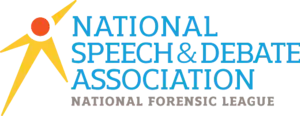National Speech and Debate Association
The National Speech and Debate Association (NSDA) is the largest interscholastic speech and debate organization serving middle school and high school students in the United States.[1] It is also the national authority on public speaking and debate.
 | |
| Type | Nonprofit organization |
|---|---|
| Founded | 1925 |
| Headquarters | West Des Moines, Iowa, U.S. |
Key people | Pam Cady Wycoff Board President Scott Wunn Executive Director |
| Website | speechanddebate |
NSDA was founded by Bruno Ernst Jacob, a Ripon College professor. in 1925 as the National Forensic League. As a college student, Jacob created a pocket handbook, Suggestions for the Debater, which led to the founding of the organization. The name was changed in 2014 to the National Speech and Debate Association.[2]
NSDA provides competitive speech and debate activities, resources, comprehensive training, scholarship opportunities, and advanced recognition to more than 140,000 students and coaches each year.
National Speech and Debate Tournament
The annual National Speech and Debate Tournament marks the capstone of speech and debate activities for more than 140,000 members across the country. Students must qualify for the National Tournament through their District Tournament. The 2023 National Speech and Debate Tournament was held in Mesa, Arizona from June 11–16, 2023.
Honor Society
NSDA's Honor Society, also known as the National Forensic League, recognizes middle school and high school students and coaches for participation in speech and debate activities.[3] Students earn merit points for participation in one of the oldest and most respected honor societies known to college admissions offices.[4]
Members of the Honor Society are held to a Code of Honor, which includes the highest standards of humility, equity, integrity, respect, leadership, and service. The Code of Honor reflects the core values of and standards for participation within the organization.
Events
To create standards for national competition, the National Speech and Debate Association defined a number of speech and debate events that are prevalent in the United States that have been adopted by many states.[5]
Speech
Speech involves a presentation by one or two students that is judged against a similar type of presentation by others in a round of competition. There are two general categories of speech events, public address events and interpretive events.
- Public address events feature a speech written by the student, either in advance or with limited prep, that can answer a question, share a belief, persuade an audience, or educate the listener on a variety of topics.
- Interpretation events center upon a student selecting and performing published material.
Public Address events
- Commentary (EXC)
- Declamation (DEC)
- Expository (EXP)
- Impromptu (IMP)
- Information Speaking (INF)
- International Extemporaneous Speaking (MX)
- Original Oratory (OO)
- Original Spoken Work Poetry (SW)
- Pro Con Challenge (PCC)
- United States Extemporaneous Speaking (USX)
Interpretation events
- Dramatic Interpretation (DI)
- Duo Interpretation (DUO)
- Humorous Interpretation (HI)
- Poetry (POE)
- Program Oral Interpretation (POI)
- Prose (PRO)
- Storytelling (STO)
Debate
Debate involves an individual or a team of students working to effectively convince a judge that their side of a resolution or topic is, as a general principle, more valid. Students in debate come to thoroughly understand both sides of an issue, having researched each extensively, and learn to think critically about every argument that could be made on each side.
Debate events
- Big Questions (BQ)
- Congressional Debate (House and Senate) (CON)
- Extemporaneous Debate (XDB)
- Lincoln-Douglas Debate (LD)
- Policy Debate (CX)
- Public Forum Debate (PF)
- World Schools Debate (WS)
For a more in-depth explanation of each speech and debate event, NSDA has a competition events guidebook.
Notable Speech and Debate alumni
Many NSDA alumni have risen to the pinnacle of their respective fields, including:[6]
Authors and film
Business and economics
Communications and media
Culinary Arts
Entertainment
- Brian Baumgartner
- Chadwick Boseman
- Nancy Cartwright
- Stephen Colbert
- Chris Colfer
- James Dean
- Joyce DeWitt
- Zac Efron
- Billy Eichner
- Josh Gad
- Ginger Gonzaga
- David Henry Hwang
- Cherry Jones
- Shelley Long
- Idina Menzel
- Jordan Peele
- Kal Penn
- Brad Pitt
- Paul Rudd
- Bruce Springsteen
- Maria Thayer
- Kenan Thompson
- Stephen Tobolowsky
- Michael Urie
- Oprah Winfrey
- BD Wong
Government
Law
Technology
References
- "What Is Forensic Competition?". Small Business - Chron.com. Retrieved 2023-02-10.
- "Rebranding - USA National Forensic League becomes National Speech and Debate Association". Retrieved 2023-02-10.
- "NSDA Honor Society". Pattonville Speech & Debate. Retrieved 2023-02-10.
- "National Speech and Debate Association". www.ppmhcharterschool.org. Retrieved 2023-02-10.
- "About NSDA". EASTMO SPEECH and DEBATE. Retrieved 2023-02-10.
- "26 Famous People Who Were on the Debate Team". Ranker. Retrieved 2023-02-10.
- Mazzei, Patricia (2022-02-26). "How a High School Debate Team Shaped Ketanji Brown Jackson". The New York Times. ISSN 0362-4331. Retrieved 2023-02-10.